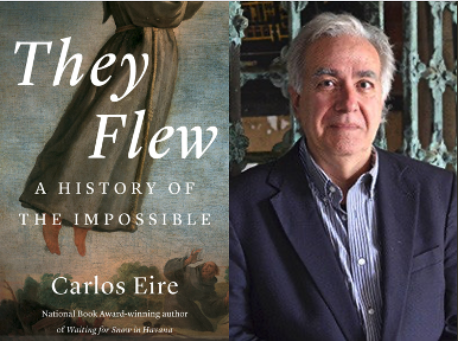March 20, 2024
Carlos Eire, T. Lawrason Riggs Professor of History and Religious Studies and a longtime associate of the Project on Lived Theology, has recently published a startling and stunning history of levitation and bilocation in, principally, the early modern era. They Flew recovers the history of devout Christians, well, flying – rising from the earth, moving through the air. Are levitation and bilocation Christian spiritual practices? How should we in the twenty-first-century think about these early modern flights?
The PLT spoke with Professor Eire about the book.
PLT. You say, early in the book, that you have been thinking about this topic for some 40 years.
Eire: All of my work – all of it, from the very beginning — has been about the ways in which the seen and the unseen, the material and spiritual, the natural and the supernatural relate to each other. Everything I’ve written, absolutely everything, is about that – They Flew is only a little more direct.PLT. “Lived theology” is interested in finding the theological meanings not just in texts but in people’s embodied experiences of faith. If we consider levitating bodies as theological texts, what do they show us?
Eire. The interconnectedness of the physical and the spiritual, and the multidimensional nature of religious experience. Jesus is involved, too. Teresa of Avila, whose levitations were among the first that captured my attention, has many visions of Jesus and communicated with Jesus – her confessors told her that it could not be Jesus who was visiting her. But Jesus kept on showing up and insisting that he was Jesus indeed. And, meanwhile, she kept begging God to stop those levitations, please!
PLT. Who gets to levitate? I would kind of like to levitate, I think.
Eire. These people who flew had a very close relationship with the divine. They made a choice, to go down a certain path – a path of receptivity. And the levitation was a super-charged encounter with the divine – an encounter that meant something to the person who is levitating and to the people around them. To the person levitating, what’s happening is uncontrollable – they are literally possessed by the divine. To those around, it’s a sign that this person is having this special relationship to the divine. Why does God play around like this, with humans? What we see in these episodes is almost like a trickster God.
Of course, the Bible is full of similar things God does – full of instances in which the disciples see something and can’t explain it to themselves – they are dumbfounded. And beginning in the 18th century, we become even more estranged from language that can speak these experiences. Dogmatic materialism has impoverished the Christian religion tremendously because it’s myopic – it removes the otherworldly from Christianity. The Social Gospel is a wonderful thing – until it jettisons the other side of religion, the transcendent side.
PLT. On the question of the intersection of the otherworldly and the social and political here and now, tell me about Yvonne Beauvais, aka Mother Yvonne Aimée de Malestroit.
Eire. Yvonne Beauvais! I wish I had enough time in this life to really work on her. She was born in 1901 and died 50 years later – if she had bilocated to Havana, she could have stood next to my crib. She bilocated some 150 times, and she levitated too. And, she participated in the resistance and rescued Jews, French resistance fighters and downed Allied pilots, dressing them as nuns and finding ways to get them out of France. She bilocated while she was being tortured by the Gestapo! Many of her bilocations allowed her to visit people in prisons and concentration camps. And after the war she was awarded the most prestigious medals in France.
PLT. So it sounds like she was somehow bringing together the otherworldly and the urgently-this-worldly.
Eire. Yes. She was doing what she could in a very worldly and otherworldly way to help those who are in prison or whose lives are in peril.
PLT. Were you changed by finally writing this book that had been simmering for four decades?
Eire. I am much more comfortable speaking openly about the significance of the otherworldly. What is the promise of Christian religion if not otherworldly – my kingdom is not of this world! Jesus comes and this world is still full of pain and suffering – but we are headed, personally and socially, to another phase, to a new kingdom, a new realm, and a new Jerusalem.

